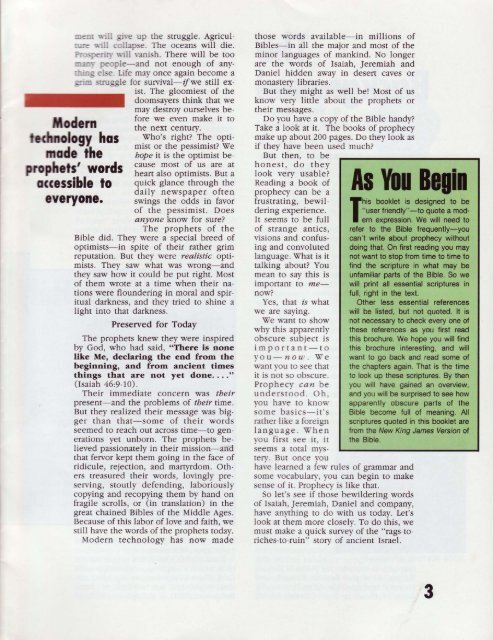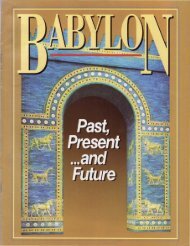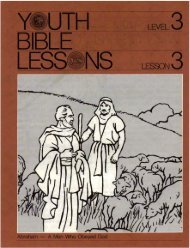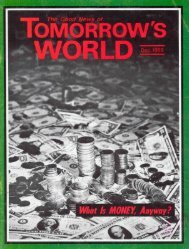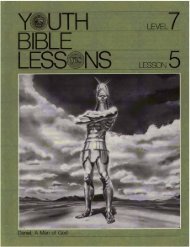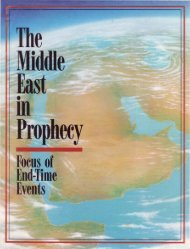Introduction to Prophecy - Church of God - NEO
Introduction to Prophecy - Church of God - NEO
Introduction to Prophecy - Church of God - NEO
You also want an ePaper? Increase the reach of your titles
YUMPU automatically turns print PDFs into web optimized ePapers that Google loves.
',e up the struggle. Agricul·collap e. The oceans will die.ill vanish. There will be <strong>to</strong>o;>eople-and not enough <strong>of</strong> any·., e. Life may once again become aggle for survival-ifwe still ex·ist. The gloomiest <strong>of</strong> thedoomsayers think that wemay destroy ourselves be-oderno 09Y hasade thephets' wordsccessible <strong>to</strong>everyone.fore we even make it <strong>to</strong>the next century.Who's right? The opti·mist or the pessimist? Wehope it is the optimist be·cause most <strong>of</strong> us are atheart also optimists. But aquick glance through thedaily newspaper <strong>of</strong>tenswings the odds in favor<strong>of</strong> the pessimist. Doesanyone know for sure?The prophets <strong>of</strong> theBible did. They were a special breed <strong>of</strong>optimists-in spite <strong>of</strong> their rather grimreputation. But they were realistic opti·mists. They saw what was wrong-andthey saw how it could be put right. Mos<strong>to</strong>f them wrote at a time when their nationswere floundering in moral and spiroitual darkness, and they tried <strong>to</strong> shine alight in<strong>to</strong> that darkness.Preserved for TodayThe prophets knew they were inspiredby <strong>God</strong>, who had said, "There is nonelike Me, declaring the end from thebeginning, and from ancient timesthings that are not yet done .... "(Isaiah 46:9·10) .Their immediate concern was theirpresent-and the problems <strong>of</strong> their time.But they realized their message was big·ger than that-some <strong>of</strong> their wordsseemed <strong>to</strong> reach out across time-<strong>to</strong> gen·erations yet unborn. The prophets be·lieved passionately in their mission-andthat fervor kept them going in the face <strong>of</strong>ridicule, rejection, and martyrdom. Otherstreasured their words, lovingly preserving,s<strong>to</strong>utly defending, laboriouslycopying and recopying them by hand onfragile scrolls, or (in translation) in thegreat chained Bibles <strong>of</strong> the Middle Ages.Because <strong>of</strong> this labor <strong>of</strong> love and faith, westill have the words <strong>of</strong> the prophets <strong>to</strong>day.Modern technology has now madethose words available-in millions <strong>of</strong>Bibles-in all the major and most <strong>of</strong> theminor languages <strong>of</strong> mankind. No longerare the words <strong>of</strong> Isaiah, Jeremiah andDaniel hidden away in desert caves ormonastery libraries.But they might as well be! Most <strong>of</strong> usknow very little about the prophets ortheir messages.Do you have a copy <strong>of</strong> the Bible handy?Take a look at it. The books <strong>of</strong> prophecymake up about 200 pages. Do they look asif they have been used much?But then, <strong>to</strong> behonest, do theylook very usable?Reading a book <strong>of</strong>prophecy can be afrustrating, bewil·dering experience.It seems <strong>to</strong> be full<strong>of</strong> strange antics,visions and confus·ing and convolutedlanguage. What is ittalking about? Youmean <strong>to</strong> say this isimportant <strong>to</strong> menow?Yes, that is whatwe are saying.We want <strong>to</strong> showwhy this apparentlyobscure subject isi m po rt a nt - t oyou- n o w. W ewant you <strong>to</strong> see thatit is not so obscure.Proph ecy ca n beunde rs<strong>to</strong>od . Oh,you have <strong>to</strong> knowsome basics-it'srather like a foreignla n g u age . Wh e nyo u first see it, itseems a <strong>to</strong>tal mys·tery. But once youAs Yol BeginThis booklet is designed <strong>to</strong> be"user friendly"-<strong>to</strong> quote a mod·ern expression. We will need <strong>to</strong>refer <strong>to</strong> the Bible frequently-youcan't write about prophecy withoutdoing that. On first reading you maynot want <strong>to</strong> s<strong>to</strong>p from time <strong>to</strong> time <strong>to</strong>find the scripture in what may beunfamiliar parts <strong>of</strong> the Bible. So wewill print all essential scriptures infull, right in the text.Other less essential referenceswill be listed, but not quoted. It isnot necessary <strong>to</strong> check every one <strong>of</strong>these references as you first readthis brochure. We hope you will findthis brochure interesting, and willwant <strong>to</strong> go back and read some <strong>of</strong>the chapters again. That is the time<strong>to</strong> look up these scriptures. By thenyou will have gained an overview,and you will be surprised <strong>to</strong> see howapparently obscure parts <strong>of</strong> theBible become full <strong>of</strong> meaning. Allscriptures quoted in this booklet arefrom the New King James Version <strong>of</strong>the Bible.have learned a few rules <strong>of</strong> grammar andsome vocabulary, you can begin <strong>to</strong> makesense <strong>of</strong> it. <strong>Prophecy</strong> is like that.So let's see if those bewildering words<strong>of</strong> Isaiah, Jeremiah, Daniel and company,have anything <strong>to</strong> do with us <strong>to</strong>day. Let'slook at them more closely. To do this, wemust make a quick survey <strong>of</strong> the "rags· <strong>to</strong>riches-<strong>to</strong>·ruin" s<strong>to</strong>ry <strong>of</strong> ancient Israel.3


